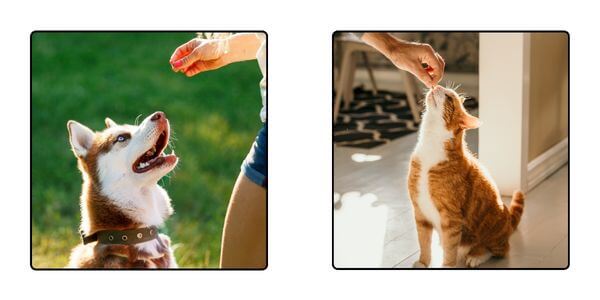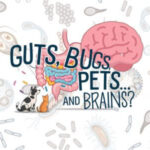
Sometimes, our furry friends struggle to cope with everyday difficulties that other pets seem to sail on through.
Sometimes, the little worries they wrestle with day to day can build up, eventually turning into long-term anxiety. It can affect our pets well-being and quality of life. Long term stress can even shorten lives.
And if pets are suffering, you know that the families that love anxious pets are suffering too.
The struggle is real.
It’s not only heartbreaking to see our furry friends so stressed and fearful, but it’s also exhausting to constantly anticipate when and where the next stress trigger will spark anxiety in our pets—and then navigate the challenge of avoiding it.
It becomes a source of anxiety for owners!
There are prescription medications that can be given, after consultation with a veterinarian, that can help with both chronic and acute anxiety. Many pets with severe and prolonged behavior problems will benefit from medications, and/or a consultation with a veterinary behavior specialist.
We do have other tools in our veterinary toolbox though.
Things that owners can do at home, and safe supplements that have been studied in people and pets.
Trend Alert: Adaptogens are natural substances that help the body handle stress and are trending lately as supplements for stress in people. There is a whole adaptogenic drink trend!
Read on to see if adaptogens will make it on my list of top natural anti-anxiety supplements.
Will your dog be sipping an adaptogenic drink at the trendy dog park down the street?

What do we mean when we talk about stress and anxiety?
Stress is what we feel physically or mentally when we face something that seems too challenging to cope with.
When this happens, the body releases the stress hormones cortisol and adrenaline, which activate the “fight-or-flight” response. This response puts the body on high alert, ready to fight or run from any danger.
That is incredibly helpful in short bursts and is a natural way our bodies react to immediate threats.
Long term? Not so good.
The body is not designed to be on high alert for days and weeks on end. Staying in this constant state of readiness takes a serious toll on the body. We see an increase in deadly chronic diseases that lead to shorter lives and increased suffering, in people and pets.
What are the most important ways that prolonged stress and anxiety can impact health and lifespan?
1. Metabolic Disease
Over time, high levels of cortisol lead to Metabolic Disease (abnormalities in the processes that convert food to energy).
Cortisol causes high blood sugar levels ( getting the body ready to fight or run) and in response to this, insulin is released and remains elevated. Insulin is the major hormone that gets sugar from the bloodstream into the cells to be used as energy. Over time the body becomes resistant to this high level of insulin. More and more is produced to try to get the same effect.
The effect of high levels of blood sugar, insulin and cortisol in the body is epic.
There is an increased risk of :
- Diabetes
- Heart disease
- Obesity
- Kidney disease
- Fatty Liver disease
- Chronic inflammation
- Certain cancers
- Brain degeneration
2. Decreased Brain Health and Mood
We can see a decrease in:
- Levels of feel-good neurotransmitters (signals) serotonin and dopamine
- Memory
- Cognitive function
4. Increased Oxidative Stress
Oxidative stress occurs when there’s an imbalance between damaging free radicals and the body’s ability to neutralize them with antioxidants.
Free radicals are unstable molecules produced naturally in the cell during energy production . They are highly reactive because they have unpaired electrons and seek to “steal” electrons from nearby molecules, causing damage to cells, proteins, lipids, and even DNA.
The body uses antioxidants (like vitamin C, vitamin E, and glutathione) to neutralize free radicals and minimize the damage.
Cortisol causes increased production of these damaging free radicals, and decreases in protective antioxidants.
Over time this will lead to:
- Chronic disease like diabetes, heart disease and cancer
- Accelerated aging
- Shorter life
5. Decreased Gut Health
Long term elevated cortisol can lead to:
- Microbiome changes- changes in the guts natural population of microbes
- ¨Leaky Gut¨syndrome- the gut lining loses integrity and allows toxins and bacteria to leak into the bloodstream
- Reduced absorption of nutrients
- Increased risk of inflammatory gut diseases
What do our pets get anxious about and how do they show us?
Causes of stress for pets:
- Changes in the house, environment or routines
- Loud noises- fireworks, thunder, construction
- Uncomfortable interactions with people or other dogs
- Separation from owners
- Health problems- pain and illness
Signs of stress in pets:
- Whining and barking, meowing
- Trembling, drooling, panting
- Restlessness, pacing, hiding, withdrawing from normal activities
- Decreased appetite, or sometimes vomiting or diarrhea
- Changes to body language

Dogs: Flattened ears, tucked tail, lip licking, yawning (when not tired), and avoiding eye contact

Cats: Flattened ears, crouching, wide eyes, puffed-up tail, or hiding
Top 5 things we can do to help our pets with daily stress and long term anxiety:
1. Training
Training in a fun and positive way can have many great benefits for pets and owners, beyond reducing stress and anxiety. It can:
- build confidence
- provide mental stimulation
- provide exercise
- teach more desirable behaviors, instead of ¨stressed-out¨ones
Check out my article on clicker training and add this fun little tool to your pet parent toolbox!
Redirection is a way of teaching a pet to do a simple task, like ¨sit¨ or ¨look¨ instead of the behavior you don´t want. We are redirecting the pet´s attention from something they are worried about, like a strange person or dog approaching on the street, and putting their attention elsewhere.

Counterconditioning and desensitization gradually expose the pet to their stress trigger. By pairing the trigger with rewards like food, we aim to replace fear with calmness.
Rather than distracting from the fear, it helps the pet feel better about the scary thing.
Patience and commitment are necessary as this type of training takes many sessions. Check out this article for a more detailed description of how to use these techniques.
A consultation with your vet or a behavior specialist would be helpful for developing a training plan meet your pets unique needs.
2. Environmental Enrichment
Providing mental and physical stimulation for our pets is the most fun and creative thing we can do to help our pets to feel better. The whole family can be involved in providing toys and activities, and many toys can be made at home!
Options for enrichment:
- Sniff and explore walks
- Puzzle feeders, and hiding treats around the house
- Catios, cat condos, and high perches for cats
- Fun training sessions
- Playdates with familiar dog friends
- Hunting games for cats
- Ball or frisbee chasing for dogs, agility training
We are only limited by our imagination!

Check out this Posh Paws article specifically about environmental enrichment in cats.
3. Pheromones
Pheromones are synthetic versions of calming chemicals naturally produced by pets. They mimic calming signals that animals naturally use, such as the signal a mother dog gives to her puppies to reassure them.
The pheromones come as a spray, plug-in diffuser, wipes or collar. They can be used for short term stressors like the move to a new house, or long term, like cats living in a multi-cat household.
Ceva makes two products, Feliway for cats and Adaptil for dogs.
4. Exercise
- Burns off excess energy
- Stimulates the release of feel-good chemicals (endorphins)
- Improves overall health
Bonus– when our pets get exercise, we do too, improving our health and decreasing stress!
5. Natural Supplements

We have lots of options for calming natural supplements, with varying amounts of scientific evidence on how well they work in pets. Human studies are usually miles ahead of pets, so often we need to and just go ahead and innovate.
The good news– they’re generally safe and non-sedating at recommended doses.
Let’s explore some of the best natural remedies to help your pet decrease stress and anxiety.
Please consult your veterinarian to discuss your pet´s unique situation, especially in cases of severe anxiety or aggression.
L-Theanine
Unless you live under a rock, you have probably heard how good green tea is for you! But did you know it can calm us, and our pets too?

The amino acid L-theanine is found in tea leaves, and is partly responsible for the absolutely stunning health benefits of green and matcha tea. L-theanine creates a calming effect by increasing the level of calming neurotransmitters; serotonin, dopamine and GABA.
For pets, rather than giving them cups of caffeinated tea, we can give a supplement. There are several veterinary products that incorporate this calming compound.
Solliquin by Nutramax Labs. Also contains whey protein and extract of Magnolia
Anxitane by Virbac. Chewable L-theanine for cats and dogs.
Probiotics
A healthy gut is critical for a healthy brain and good feelings.
The bi-directional communication pathway between the gut and the brain is known as the gut-brain axis.
The health of one will affect the health of the other.

Probiotics are populations of ¨good¨ bacteria that are given by mouth, or eaten in food like sauerkraut and yogurt. These microbes populate the gut and become part of the microbiome.
The trillions of little microbes are very busy and do quite a lot of work in our guts. These little guys:
- produce feel-good neurotransmitters like serotonin, dopamine, and GABA
- reduce inflammation in the gut
- help balance the level of stress hormone cortisol
Probiotics are measured in colony forming units, or CFUs. The current recommendation for dogs is 1-10 billion CFUs and cats 1-5 billion CFUs a day. Probiotics are safe and only a concern in severely immunocompromised patients.
Veterinary products:
- Purina Fortiflora – contains one strain- Enterococcus faecium
- Fortiflora Pro Synbiotic also has a prebiotic (fiber to feed the microbes)
- Purina ProPlan Calming Care Supplement- BL999 strain of bacteria specific for anxiety
- Nutramax Proviable and Proviable Forte- seven strains of bacteria and two prebiotics
Tryptophan
Tryptophan is an essential amino acid. The body doesn’t produce it and it must come from diet or a supplement. Tryptophan is converted into serotonin and melatonin in the brain.
Serotonin is one of the main feel-good signals in the brain, while melatonin is involved in the sleep-wake cycle.
The highest levels of tryptophan are in high protein foods:
- turkey
- salmon
- eggs
- dairy
- pumpkin seeds
- nuts- almonds and walnuts
- oats
- soybeans
We can also give our pets tryptophan as a supplement and in a specially formulated veterinary diet.
Royal Canin Feline Calm and Canine Calm diets contain tryptophan in a special profile of amino acids and protein levels designed to increase the uptake of tryptophan in the brain. More tryptophan in the brain means more serotonin in the brain, helping to make pets feel better. The diets also contain alpha-casozepine, a protein from milk. Read more about it below.
Another combination product is Composure Pro from Vetriscience , containing tyrptophan and L-theanine from green tea in a chewable supplement.
Alpha-Casozepine
Alpha-casozepine is a calming compound made from the digestion of casein, a protein found in cow´s milk.
It affects the inhibitory pathways of the brain, helping to decrease neuron firing and excitement. The calming neurotransmitter GABA acts as the ¨Whoa, take it down a notch¨ signal in the brain, and actually helps the brain relax. Alpha-casozepine binds to the same receptors that GABA does and makes those receptors more sensitive to the relaxing effects of GABA.
Alpha-casozepine and GABA together create a stronger calming effect than GABA by itself. This is the same mode of action as the sedative drug Valium, with none of the sedation or incoordination.
Zylkene by Vetoquinol is a veterinary product for both dogs and cats containing alpha-casozepine that can be started a few days before an upcoming stressful event or given long term. This incredibly safe supplement was one of the techniques I used with my pets before and during our big move to Nicaragua.
As noted above, it is also a component in the Royal Canin Calm foods for dogs and cats.
Ashwagandha
Adaptogens are natural compounds found in plants and mushrooms that help the body handle stress and balance hormones, neurotransmitters, immune system function and energy. They’ve been used for centuries in Traditional Indian (Ayurvedic) and Chinese Medicine.
Ashwagandha (Withania somnifera) is one of the most famous adaptogens and is called the “king” of Ayurvedic herbs because of its powerful effects on strength, energy, and resilience. It is made from the ground root of a shrub, mostly grown in India.

Studies in people and animals show that it:
- Helps reduce cortisol, managing chronic stress and promoting relaxation.
- Boosts calming neurotransmitters like GABA and serotonin, helping to ease anxiety.
- Enhances memory, focus, and brain function.
- Increases stamina and energy
- Strengthens immunity
Ashwagandha is available as a root powder, or a more bioavailable and concentrated standardized extract. This king herb is the star of many of the trendy stress busting drinks.
We don’t have to buy our pets expensive, sparkling adaptogenic drinks though. There are supplements made with concentrated extract, including some specifically for pets.
VetriScience makes a chewable product called Composure Long Lasting Calming Supplement for Dogs that is a combination of ashwagandha and L – theanine.
Just keep in mind that the main active compound in Ashwagandha is fat-soluble, so give it with a meal or a bit of healthy fat.
An anxious or fearful pet can put a strain on the whole family. I hope this article gave you some tools that you can put in your pet owner toolbox!




